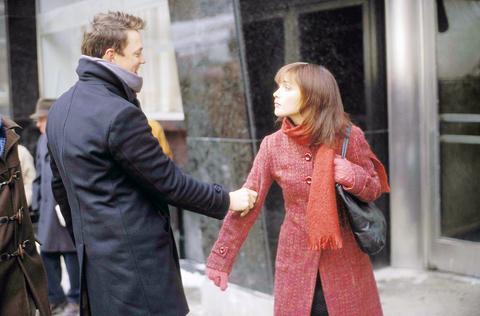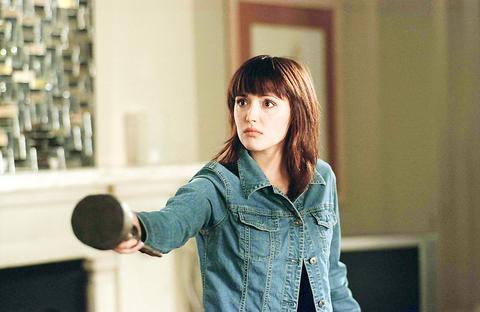Wicker Park finds Josh Hartnett, still looking like the slightly slow-witted captain of a high-school football team, as Matthew, a young Chicagoan poised on the brink of respectability. He has a beautiful, wealthy fiancee (Jessica Pare), a job with her brother's advertising agency and a plane ticket in his pocket for Shanghai, where he is to negotiate the agency's first Asian contract.
But all these fine things fade away when Matthew overhears a conversation on a restaurant pay phone. Although he can't see the face of the woman who is speaking, she sounds just like Matthew's long-lost love, Lisa (Diane Kruger, the Helen of Wolfgang Petersen's recent Troy), a dancer who disappeared from his life two years earlier without leaving a trace.

PHOTOS COURTESY OF FOX MOVIES
Not stopping to think, Matthew tosses away his fiancee, career and a first-class recliner seat to China, resolving instead to remain in the city secretly and search for his mystery woman. Helpfully, she's left a hotel key card behind in the phone booth, which Matthew snatches and uses to break into her room, where he luxuriates in the scent of her perfume and steals her favorite compact.

For a moment, you might think that Matthew is behaving like the creepiest stalker imaginable. But stalking turns out to be both the principal theme and principal activity of Wicker Park, which was adapted by Brandon Boyce from L'Appartement, a successful French thriller written and directed by Gilles Mimouni in 1996.
As the other main characters are introduced -- including Matthew Lillard as Luke, the protagonist's goofy shoe-salesman best friend; Rose Byrne as Luke's moody actress girlfriend; and eventually, the elusive Lisa herself -- it develops that practically everyone in the Windy City (played by a miscast Montreal) is following someone else, for reasons it wouldn't be fair to divulge here.

The French original was a clever Hitchcock homage with a murder at its center. For reasons unknown, the murder plot has been dropped from the remake (though a few confusing traces of it remain), which leaves Wicker Park without much real urgency to drive its extremely contrived plot. Behavior that might be understandable and acceptable when there's a life at stake starts to look silly and irresponsible when it's motivated only by the characters' crushes on each other. And the glum, mumbling Hartnett is no James Stewart, able to draw the viewer into the depths of his erotic obsession as Stewart did so memorably in Rear Window and Vertigo.

McGuigan, who last March had the medieval murder mystery The Reckoning in theaters, has clear talents as a filmmaker. He employs an interesting split-screen effect, using digitally blurred borders instead of the standard hard matting to compare multiple points of view, and there are a couple of eerily elongated shots of empty corridors that Hitchcock might have appreciated. But directorial touches can't do much to salvage a project as poorly conceived as this one.


The canonical shot of an East Asian city is a night skyline studded with towering apartment and office buildings, bright with neon and plastic signage, a landscape of energy and modernity. Another classic image is the same city seen from above, in which identical apartment towers march across the city, spilling out over nearby geography, like stylized soldiers colonizing new territory in a board game. Densely populated dynamic conurbations of money, technological innovation and convenience, it is hard to see the cities of East Asia as what they truly are: necropolises. Why is this? The East Asian development model, with

June 16 to June 22 The following flyer appeared on the streets of Hsinchu on June 12, 1895: “Taipei has already fallen to the Japanese barbarians, who have brought great misery to our land and people. We heard that the Japanese occupiers will tax our gardens, our houses, our bodies, and even our chickens, dogs, cows and pigs. They wear their hair wild, carve their teeth, tattoo their foreheads, wear strange clothes and speak a strange language. How can we be ruled by such people?” Posted by civilian militia leader Wu Tang-hsing (吳湯興), it was a call to arms to retake

This is a deeply unsettling period in Taiwan. Uncertainties are everywhere while everyone waits for a small army of other shoes to drop on nearly every front. During challenging times, interesting political changes can happen, yet all three major political parties are beset with scandals, strife and self-inflicted wounds. As the ruling party, the Democratic Progressive Party (DPP) is held accountable for not only the challenges to the party, but also the nation. Taiwan is geopolitically and economically under threat. Domestically, the administration is under siege by the opposition-controlled legislature and growing discontent with what opponents characterize as arrogant, autocratic

When Lisa, 20, laces into her ultra-high heels for her shift at a strip club in Ukraine’s Kharkiv, she knows that aside from dancing, she will have to comfort traumatized soldiers. Since Russia’s 2022 invasion, exhausted troops are the main clientele of the Flash Dancers club in the center of the northeastern city, just 20 kilometers from Russian forces. For some customers, it provides an “escape” from the war, said Valerya Zavatska — a 25-year-old law graduate who runs the club with her mother, an ex-dancer. But many are not there just for the show. They “want to talk about what hurts,” she